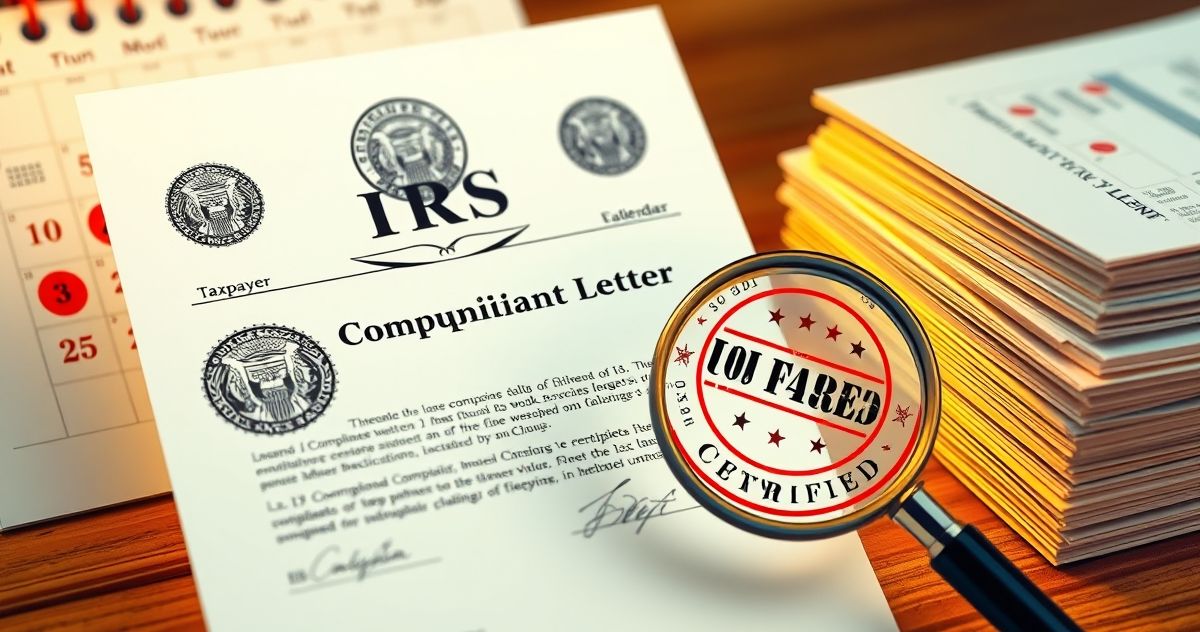What is IRS Compliance Letter Approval?
The IRS Compliance Letter Approval is a formal acknowledgment by the Internal Revenue Service (IRS) which confirms that a taxpayer, either an individual or a business, has met specific compliance requirements set forth by tax regulations. This letter serves as documentation of a taxpayer’s adherence to the federal tax code and is often necessary for various financial and legal transactions, including business contracts and loan applications.
Primary Purpose
The primary purpose of the IRS Compliance Letter Approval is to provide a taxpayer with assurance of their standing regarding tax compliance. Receiving this letter indicates that the individual or business has successfully fulfilled all relevant tax obligations, such as filing returns accurately and timely, paying dues, and meeting reporting criteria under the tax code.
Key Features and Components
Verification of Compliance
The core component of an IRS Compliance Letter Approval is the verification that the taxpayer has met all necessary compliance requirements. This evaluation includes analyzing tax returns, payment status, and overall financial conduct according to IRS standards.
Authority and Authenticity
The IRS Compliance Letter is an official document, carrying the authority and authenticity of the IRS. It typically includes identifiable information, such as the taxpayer’s name, tax identification number, and details outlining the timeframe and nature of compliance.
Time-Bound Validity
These letters are often valid for a specified period, usually aligning with the tax year reviewed. After this period, taxpayers might be required to obtain a new compliance assurance if deemed necessary for ongoing or future transactions.
Relevant Filing and Compliance Requirements
To receive the IRS Compliance Letter Approval, taxpayers must meet several requirements:
- Accurate Filing: Ensure all tax returns are filed accurately with correct information.
- Timely Payments: Payments associated with federal tax obligations must be made on time to avoid penalties.
- Reporting Accuracy: All income, deductions, credits, and other relevant financial information must be fully reported.
- Documentation: Taxpayers must maintain requisite documents and records that substantiate claims on their tax filings.
Failure to comply with these requirements may result in denial of the compliance letter, requesting additional information from taxpayers, or adjustments to submitted filings before approval is granted.
Penalties and Consequences for Non-Compliance
Not achieving a compliance approval status with the IRS can lead to several potential repercussions:
- Financial Penalties: Taxpayers may incur fines, interest, or other monetary penalties for failing to achieve compliance.
- Legal Actions: Continued non-compliance may result in more severe actions, including audits or legal proceedings by the IRS.
- Restricted Transactions: Non-compliance can limit a taxpayer’s ability to engage in financial transactions, such as securing loans or public contracts, as proof of good standing is often required.
Importance in Tax and Financial Compliance
The IRS Compliance Letter Approval holds significant importance for several reasons:
- Proof of Good Standing: Serves as an essential document evidencing an individual’s or business’s tax compliance, necessary for many transactions.
- Facilitating Business and Financial Operations: With a compliance letter, businesses can secure partnerships, bids for contracts, or financial funding opportunities.
- Reducing Risk of Audits: Demonstrating compliance reduces the risk of attracting targeted audits and reviews from the IRS.
- Enhancing Credibility: Adds credibility and reliability to a taxpayer’s financial practices, fostering better relations with financial and legal entities.
Overall, attaining the IRS Compliance Letter Approval is a crucial step toward maintaining orderly tax procedures and enhancing credibility in financial dealings. It ensures taxpayers have met all legal tax obligations, serving as a protective measure against potential legal and financial pitfalls related to tax discrepancies.

